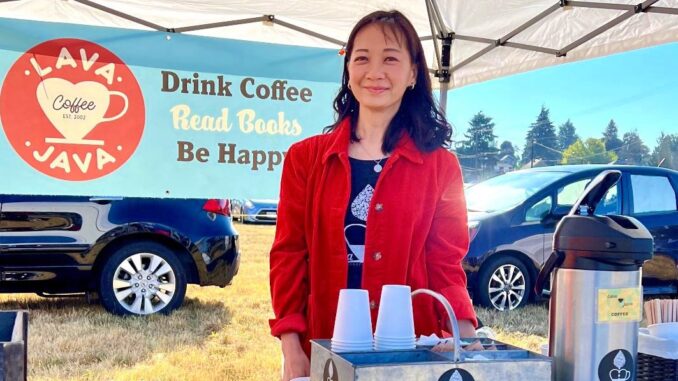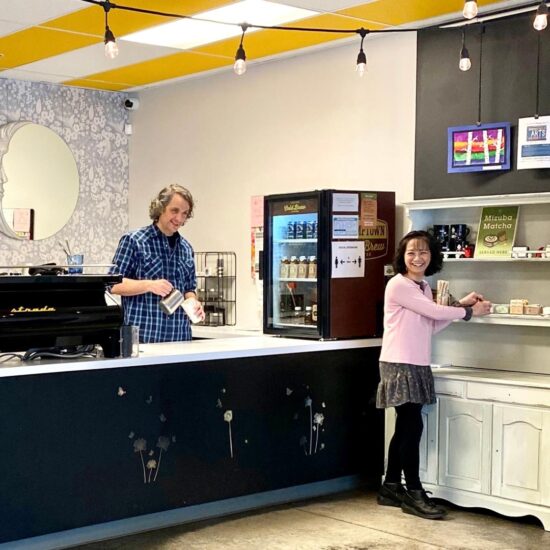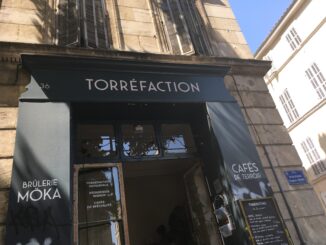
Former U.S. Barista Champion Phuong Tran shares the challenges one may face when running a pop-up café and how to navigate them.
BY EMILY MENESES
SENIOR ONLINE CONTRIBUTOR
Photos courtesy of Phuong Tran
A few weeks ago, we shared two-time Indonesia Barista Champion Mikael Jasin’s take on the perks of running a pop-up café versus a brick-and-mortar. Today, we’re exploring the possible challenges that one may run into when running a pop-up and how to navigate them through the lens of Phuong Tran, winner of the 2005 U.S. Barista Championship and owner of Ridgefield, Wash.’s Lava Java. (Phuong is also the subject of the “One on One“ feature in the October + November 2022 issue of Barista Magazine; check out the article here.)
Here are some possible challenges of running a pop-up café and how to navigate them, as explained by Phuong Tran.
1. Work around the limitations that come from not having a “permanent” space.
In 2012, Phuong started a pop-up cafe inside a Portland bike shop. “At the time, I’d been operating my Lava Java brick-and-mortar café for 10 years, so it seemed doable—and [overall], the experience was incredible,” she shares.
“One of the biggest challenges I faced was having to keep the same hours as the bike shop,” she continues. “Other challenges were the long commute I had from Ridgefield to Portland. And there were also limited parking spaces available in proximity to the bike shop because it was located in a busy downtown area. Lastly, we didn’t have very much space for storage at all.”
Phuong went on to share that it’s important to be aware of possible limitations you may face, depending on where and when your pop-up is taking place. “I think having all [possible] concerns answered in a written agreement or contract is very important,” she explains. “Finding a location that’s close to where you live will help cut down the commute, and negotiating for secured storage space is also critical.”

2. Be mindful of the location.
Phuong brings up the fact that pop-up cafés do best in places that get a lot of foot traffic. For example, her pop-up did well because it was located in Portland, a very walkable city.
“I think location, location, location is key for a pop-up café,” she explains. “A space where there’s lots of foot traffic will work well. I think any city will work as long as you [do your] research [to make sure] there will be enough foot traffic to support your pop-up space.”
3. Learn to work with limited resources.
Brick-and-mortar shops give you more room for a kitchen and storage. When running a pop-up café, you may not be able to have an extensive menu. Additionally, you’ll be working with limited space and equipment.
“We had to learn how to operate in a small space with a stripped-down menu [without] all of the conveniences of our shop in Ridgefield,” Phuong shares.

4. Learn when to say “no.”
Phuong also shares that it’s important to stay conscious of which events and opportunities will be good for your business, and which ones to pass on.
“I learned that sometimes, I needed to say no to being open for special events [outside of] normal operating hours,” Phuong says. “Some special events ended up costing more time and expenses in the end than what they were worth.”
Worth It
Overall, Phuong still recommends starting a pop-up café—as long as you’re aware of the possible challenges that may arise. “The experience [of running a pop-up] was incredible,” she shares. “My team and I met so many people, and some of them turned into friends we still keep in contact with. I totally would recommend starting a pop-up because of the low overhead. It’s a great start for those who want to gain some experience before launching a brick-and-mortar.”
ABOUT THE AUTHOR
Based in Los Angeles, Emily Joy Meneses (she/her) is a writer and musician passionate about culture and collective care. You can regularly find her at Echo Park Lake, drinking a cortado and journaling about astrology, art, Animal Crossing, and her dreams. Explore her poetry, short stories, and soundscapes on her website.




